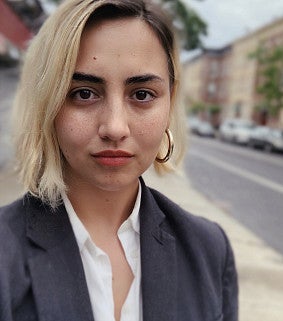
Francesca Fontana, Class of 2017
by Sarah Hovet, CHC Communications
A typical day for Francesca Fontana begins around 7:30 a.m., when she enters The Wall Street Journal offices in New York, two hours before the stock market opens.
Her first task is writing the column “Stocks to Watch,” which discusses 8-12 stocks anticipated to move throughout the day. Then, the stock market opens at 9:30 a.m.
Fontana spends the rest of the day filing “Market Talks,” stories that analyze why and how prices and futures change. She covers U.S. equities and stocks, some Canadian stocks, and the livestock and grain market.
“I’ve learned a lot about bushels of things,” says Fontana, now fluent in trade tariffs and soybean futures.
Fontana graduated from CHC in June 2017 and began an internship at The Wall Street Journal the next week. She interned as a writer on the Management and Careers team.
The F. James Pensiero Reporting Internship gives preference to students from state schools, and Fontana qualified. “It felt crazy,” Fontana says about getting the internship. “It was my dream internship, my dream job.”
In her role on the Management and Careers team at WSJ, she worked on features, with the pressure to get stories out on the newswires. As the internship ended, she stayed on for a while because she had begun working on what she still considers the most exciting project she has tackled at WSJ so far.
The project constituted part of WSJ’s annual “Women in the Workplace” package. Fontana tackled the issue of “vocal fry,” the scratchy quality a person’s voice can take on, a “closing a door really slowly kind of sound,” as she put it. Vocal fry is a verbal tic typically associated with women and deemed “unprofessional,” like upspeak.
“We should listen to what women have to say and not how they’re saying it,” Fontana says. Her editor tasked her with creating a video for WSJ’s Snapchat account. In the process, Fontana talked to both a linguist and an actress who visits a vocal coach to try to eliminate her vocal fry. Fontana learned that men often also speak with vocal fry, but it is usually only policed in women. Her biggest thrill came when her editor told her to narrate the video.
After the project concluded, Fontana freelanced in New York and briefly wrote for financial news website TheStreet. She maintained relationships at WSJ, and eventually started her current full-time job there.
As a first-generation, multi-ethnic student, Fontana sometimes felt isolated at the University of Oregon. However, she cherishes the opportunities the Honors College provided for her in the form of the thesis.
While an undergraduate, she received an Honors College thesis research grant to travel to Chicago and report a story about her own past. Her research culminated in a book proposal and several chapters for an investigative memoir about a criminal trial involving her father that unfolded during her childhood. The proposal and beginnings of the manuscript became her Honors College thesis project. She took thesis credits for classes, allowing her to spend time interviewing and exploring records in Chicago while school was in session.
“It was challenging for me as a journalist, student, and person,” she says. “The project really shaped me and gave me my independence.”
In the process, Fontana learned “nothing can substitute for the work.” By that, she explains she means work hard, but do work that is meaningful. As a School of Journalism and Communication student, she felt pressure to jump from Flux Magazineto The Daily Emerald to a handful of other opportunities. But, ultimately, she learned to do the work she enjoyed doing, not the work that other people expected her to do.
“Make the time to not be working,” she adds. “It’s cool to get eight hours of sleep!”
